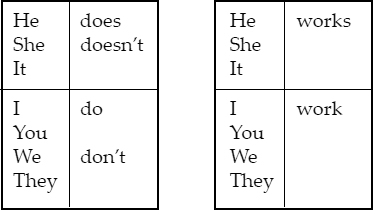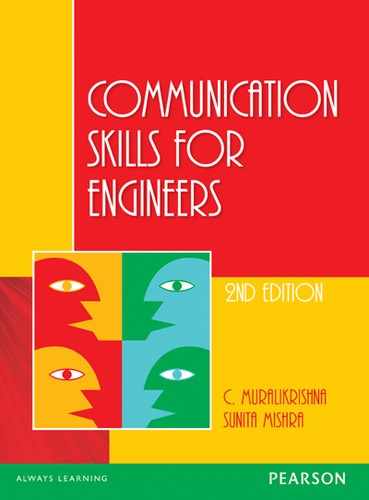APPENDIX B
Common Errors in English Communication
WRONG USE OF PREPOSITIONS/PREPOSITION PHRASES.
Unnecessary Use of Prepositions
There is a general tendency in most people to add prepositions after verbs where their use is unnecessary. In the following sentences, the underlined prepositions are unnecessary. You must try to avoid them in your speech and writing:
- The manager admired for our home guard's bravery.
- The security admitted him in.
- They hope you would answer to their request soon.
- My cousin approached to me for help.
- The boss asked to the clerk why she was late.
- The leaders attacked upon the Chairman's views.
- The guard was awarded with a cash prize for his alertness.
- The company could not bear up the burden of heavy taxes.
- Computers have greatly benefited to the communication network in the country.
- The management refused to bow down to the worker's demands.
Omission of Prepositionsh
Another tendency in many people is to omit prepositions in places where they are necessary. The following are some samples. They should be used with the preposition as given in brackets.
- That is an idea we fully agree. (agree with)
- She came and asked the car. (asked for)
- The manager assured us loan. (assured us of)
- We will have to bear her short temper. (bear with)
- Would you care some juice? (care for)
- We could not convey him the bad news. (convey to him)
- They have to explain us the problem. (explain to)
- If they go there, they will have to put up many difficulties. (put up with)
- My colleagues presented him an expensive gift. (presented him with)
- They will write us again soon. (write to us)
Use of Wrong Prepositions
The following sentences are examples of the use of wrong prepositions. The correct use is given in the brackets. Replace the preposition underlined with the one given in brackets against each sentence.
- She was trying to aim her remarks against her friend. (at)
- My boss is angry against me. (with)
- That child is bad in spelling. (at)
- That manager has great confidence about his secretary. (in)
- She is very good in tennis. (at)
- That thief confessed about his crime. (to)
- That staff member has been charged of misappropriation. (with)
- The boy is suffering with malaria. (from) 1
- We want to dispense of his services. (with)
- Will you sign the document with ink? (in)
USE OF WRONG TENSES
In the following sentences, the verbs are in the wrong tense. They ought to be replaced by the form of the verbs given in brackets against each sentence.
- I am hearing that you are leaving for the West Indies next month. (hear)
- He is forgetting to do his duties very often. (forgets)
- We think to hold the tournament next month. (are thinking of holding)
- They have booked our tickets yesterday. (booked)
- He is playing cricket from his 6th class. (has been playing)
- It happened when I stood in the bus stand. (was standing)
- Ask him about the document when he will arrive. (arrives)
- On Sunday next week, I am eating biryani. (am going to eat)
- I am understanding the lecture with some effort. (understand)
- she is remembering me very well. (remembers)
- she is loving her friend. (loves)
- I am having a headache. (have)
USE OF WRONG WORDS
One of the mistakes committed by many people is the use of inappropriate words in sentences because of the confusing nature of similar looking words or near synonyms. In the following sentences, the underlined words are to be replaced by the words in brackets.
- She refuses to hear me when I give my suggestions. (listen to)
- I liked the travel a lot. (journey)
- The staff strike didn't have any affect on the boss. (effect)
- He doesn't seem to care for his vehicle. (take care of)
- No one of the letters has reached in time. (none)
- This medicine seems to be very efficient. (effective)
- She didn't do this mistake. (make)
- He wanted to know the last score. (latest)
- The boss doesn't seem to have any principals. (principles)
- We shall discuss this issue sometimes tomorrow. (sometime)
- They shall do all the arrangements. (make)
- The parties reached a wide agreement on the issue. (broad)
- He denied to accept the gift. (refused)
- The patient was released last evening. (discharge)
- This soldier is working on the boundary of the country. (border, frontier)
USE OF WRONG AGREEMENT
- He don't know the problems involved. (doesn't)
- They doesn't believe in superstitions. (don't)
- I doesn't appreciate this technology. (don't)
- You doesn't understand what I am going through. (don't)
- They always does like that. (do)
- I didn't came to know about the accident. (come)
- They didn't knew about the function. (know)
- She didn't went to the market yesterday. (go)

In these sentences, the singularity or plurality of subjects determines whether the verb will be singular or plural. In the sentences 9-13, we also find that when two subjects are joined by “and”, the verb can be singular or plural, depending on whether the subjects are notionally singular or plural.
- Dosa and chutney are what we generally have for breakfast. (is)
- Sheela and Saheen is going shopping today. (are)
- These days, a few hundreds rupees are a meager salary. (is)
- The United States have the largest share of gold reserves. (has)
- The audience have utmost respect for the performer. (has)
If the subjects in the sentence are joined by “either ….or”, “neither…nor”, the verb agrees with the subject nearest to it. (rule of proximity)
- Either my sisters or my brother are coming. (is)
- Neither the principal nor the students is interested. (are)
When two subjects are joined by connectors like “with”, “along with”, “as well as” etc., the first subject assumes more importance. Hence, controls the verb form.
- The books, along with the stationery, has to be returned. (have)
- The cow as well as the shepherds are not to be seen since yesterday. (is)
When the subjects are preceded by words like “each”, “every”. “one”, “everyone”, etc, the verb is always singular.
- Every book and journal on the racks are torn. (is)
- Each of the students in the college want to have a copy of the book. (wants)
- One of the ships have a red mast. (has)
- Everyone in this room have a valid reason to be angry. (has)
